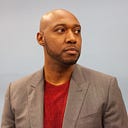The Cure for Ambivalence
As a child, Black History Month and the Civil Rights Movement failed to capture my interest or imagination beyond a few fleeting moments. They didn’t seem to play much of a role in my daily suburban life, nor did racism or the struggle for equality strike me as battles being actively fought. I felt like I happened to be black in the same way that I happened to be from Florida. These details were important, sure, but only in some peripheral way.
Growing up in the black church added another dimension to my experience, but it wasn’t sufficient to jolt me out of my cultural ambivalence. I played along, of course: memorizing the words to Lift Every Voice and Sing, politely enduring awkward exchanges with doting elders who apparently changed my diapers, and self-consciously donning the Kente print hat that my mother sewed back when that was the thing to do. I enjoyed being immersed in black culture and observing our amusing traditions, but I was mostly going through the motions.
In college I connected with my identity as a black male more deeply, but mostly in ways that were intellectually stimulating rather than culturally meaningful. One highlight was winning an award for demonstrated leadership and contributions to the black student body. I was both elated and confused. Elated because it was an honor to be recognized, but confused because I didn’t consider any of my leadership activities to be particularly…black. I was barely involved with the Black Student Union.
It’s been more than a decade since I graduated from college, and my orientation toward my identity and the black experience has changed dramatically since then. Foy many in my generation, Trayvon Martin’s death ignited a torrent of outrage and activism. I was with a friend — a Latina woman — when the Trayvon verdict was handed down, and she was inconsolable. The experience was disconcerting for me. The significance and depravity of the event scarcely registered, and I was taken aback by the intensity of my friend’s emotions.
Mike Brown’s death was a different story. Perhaps it was the 24-hour livestreams from citizen journalists, or the activists who put their bodies on the line in protest, or maybe it was seeing my countrymen being tear gassed and mercilessly provoked under the cover of night. Whatever it was, my ambivalence evaporated. What filled the void was a wave of despair, outrage, and embarrassment.
How could I have been so oblivious, uninformed, and out of touch?
It was the wake-up call that I needed, and I channeled my energies into educating myself. The books, articles, and documentaries I consumed revealed what felt like an alternate reality. A reality that threatened to radicalize me. I’m still frightened by the depravity of the thoughts I had in my moments of weakness. I finally understood what drove my brothers and sisters to the streets, and to the brink of insanity.
I thought about what life must have been like for my paternal grandparents, who were sharecroppers in rural Georgia. I thought about what life must have been like for my father, who grew up during segregation. I thought about how much time hadn’t passed since those realities were the reality for black folks in America.
And then I thought about my story. My privilege. The good fortune I had to be born into a family that paid for my college education before I graduated from high school. My father’s formative education was in a one-room shack. Mine? Private school. My mother worked part-time when I was young so she could be there for me, sacrificing tremendous career opportunities.
A few years ago, I spoke at the Whitney M. Young Jr. Memorial Conference at the University of Pennsylvania. Young was a civil rights leader whose life of public service was dedicated to the empowerment and socioeconomic advancement of the historically disenfranchised. His namesake conference is in fact the longest-running student-led conference held at The Wharton School, this year marking the 43rd.
Thumbing through the program before the opening keynote, I noticed that one of the honorees, a woman named Hettie Simmons, was to receive the Trailblazer Award. Born in 1922 in Jacksonville, Florida — my hometown — Ms. Simmons was the first African American to graduate from The Wharton School’s MBA program. She graduated in 1947, the same year Jackie Robinson broke the color barrier in professional sports.
I’ve lived long enough to understand that my childhood ambivalence was completely appropriate in some ways. The sacrifices made by those who came before me shielded me from the oppression that they themselves endured. But now that I’ve been liberated from my ignorance — woke, as they say — I’ve gained the key thing I once lacked: perspective.
A version of this article originally appeared on Abernathy.

